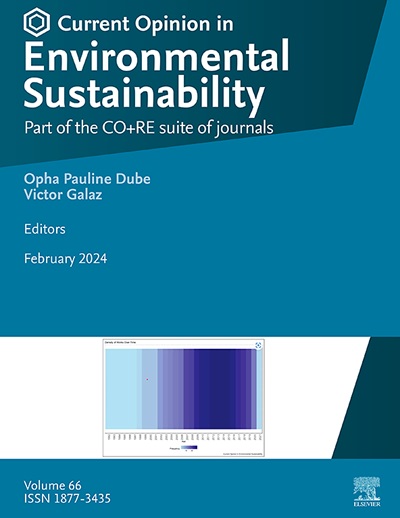Co-creating cultural narratives for sustainable rural development: a transdisciplinary learning framework for guiding place-based social-ecological research
IF 6.3
2区 环境科学与生态学
Q1 ENVIRONMENTAL SCIENCES
Current Opinion in Environmental Sustainability
Pub Date : 2025-01-20
DOI:10.1016/j.cosust.2024.101506
引用次数: 0
Abstract
Place-based social-ecological research is crucial for understanding local sustainability challenges. However, lack of transferability of insights to other locations and to larger scales remains challenging. In this paper, we present a novel transdisciplinary learning framework that links notions of cultural heritage, landscape, and social-ecological systems thinking to support sustainable rural development. Continuous dialogue, learning, and collaboration among communities and stakeholders, including researchers, take centre stage in this framework. We outline the four steps of the framework, conceptually integrating and operationalising how dialogue, learning, and collaboration can take place in each step. We tested the framework in the CULTIVATE project (https://www.cultivate-project.net), which explored the role of cultural heritage narratives in supporting sustainable rural development in four European UNESCO Biosphere Reserves. The framework successfully guided our research and comparative cross-case analysis, thereby contributing to aggregate learnings from place-based social-ecological research to develop knowledge at the national or global scale.
共同创造农村可持续发展的文化叙事:指导基于地方的社会生态研究的跨学科学习框架
基于地点的社会生态研究对于理解当地可持续性挑战至关重要。然而,缺乏对其他地点和更大范围的见解的可转移性仍然是一个挑战。在本文中,我们提出了一个新的跨学科学习框架,将文化遗产、景观和社会生态系统思维的概念联系起来,以支持可持续农村发展。在这一框架中,社区和利益攸关方(包括研究人员)之间的持续对话、学习和合作处于中心位置。我们概述了框架的四个步骤,从概念上整合和操作对话,学习和协作如何在每个步骤中进行。我们在culture项目(https://www.cultivate-project.net)中测试了该框架,该项目探索了文化遗产叙事在支持四个联合国教科文组织欧洲生物圈保护区的可持续农村发展中的作用。该框架成功地指导了我们的研究和跨案例比较分析,从而有助于从基于地方的社会生态研究中获得综合知识,从而在国家或全球范围内发展知识。
本文章由计算机程序翻译,如有差异,请以英文原文为准。
求助全文
约1分钟内获得全文
求助全文
来源期刊

Current Opinion in Environmental Sustainability
ENVIRONMENTAL SCIENCES-ENVIRONMENTAL SCIENCES
CiteScore
13.80
自引率
2.80%
发文量
52
审稿时长
6-12 weeks
期刊介绍:
"Current Opinion in Environmental Sustainability (COSUST)" is a distinguished journal within Elsevier's esteemed scientific publishing portfolio, known for its dedication to high-quality, reproducible research. Launched in 2010, COSUST is a part of the Current Opinion and Research (CO+RE) suite, which is recognized for its editorial excellence and global impact. The journal specializes in peer-reviewed, concise, and timely short reviews that provide a synthesis of recent literature, emerging topics, innovations, and perspectives in the field of environmental sustainability.
 求助内容:
求助内容: 应助结果提醒方式:
应助结果提醒方式:


